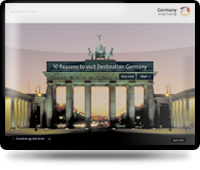Most religions agree that "the fruit of the earth and work of human hands", as it says in the Eucharist, should be considered a gift of God. At thanksgiving, a small table with harvested fruit, vegetables and a harvest wreath is set up in an appropriate spot. Farmers commemorate the trials and toil of the year gone past at lavishly decorated harvest banquets, where festive seasonal food, homemade bread and vegetable stew are served. Elements of thanksgiving also play a part in associated festivities, such as mountain cattle drives and grape harvest festivals, as well as in other religious festivals in late autumn. Harvest processions featuring some of the ancient harvest rituals still take place in some parts of Germany today.
 Skip to content
Skip to navigation
Skip to subnavigation
Skip to search
Skip to content
Skip to navigation
Skip to subnavigation
Skip to search

